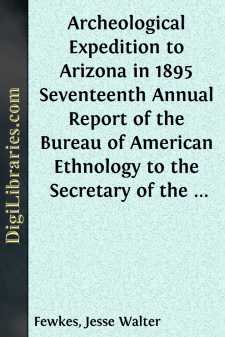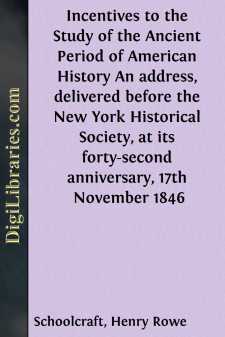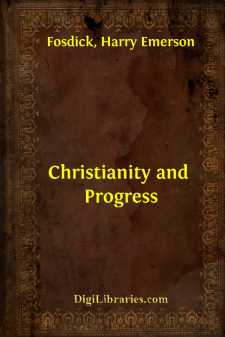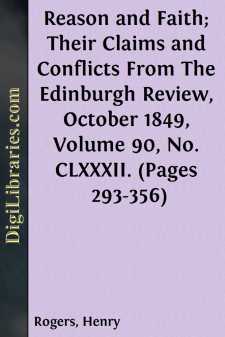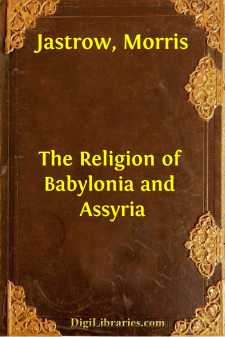Religion
- Agnosticism 2
- Antiquities & Archaeology 21
- Atheism 12
- Biblical Criticism & Interpretation 15
- Biblical Meditations 3
- Biblical Reference 1
- Biblical Studies 11
- Buddhism 8
- Christian Church 52
- Christian Education 5
- Christian Life 26
- Christianity 60
- Cults 2
- Devotional 6
- Eastern 2
- Education 4
- Eschatology 1
- Ethics 3
- General 60
- Gnosticism 1
- Hinduism 15
- History 28
- Holidays 10
- Inspirational 1
- Islam 8
- Judaism 3
- Leadership 1
- Meditations 3
- Monasticism 1
- Mysticism 11
- Philosophy 4
- Prayer 26
- Prayerbooks 5
- Religion & Science 12
- Sermons 54
- Spirituality 53
- Theism 2
- Theology 17
- Theosophy 15
Religion Books
Sort by:
by:
Julian K. Smyth
ONE AND INFINITE God is One, and Infinite. The true quality of the Infinite does not appear; for the human mind, however highly analytical and exalted, is itself finite, and the finiteness in it cannot be laid aside. It is not fitted, therefore, to see the Infinity of God, and thus God, as He is in Himself, but can see God from behind in shadow; as it is said of Moses, when he asked to see God, that he...
more...
INTRODUCTORY NOTE About the close of May, 1895, I was invited to make a collection of objects for the National Museum, illustrating the archeology of the Southwest, especially that phase of pueblo life pertaining to the so-called cliff houses. I was specially urged to make as large a collection as possible, and the choice of locality was generously left to my discretion. Leaving Washington on the 25th...
more...
AN ADDRESS. To narrow the boundaries of historical mystery, which obscures the early period of the American continent, is believed to be an object of noble attainment. Can it be asserted, on the ground of accurate inquiry, that man had not set his feet upon this continent, and fabricated objects of art, long anterior to the utmost periods of the monarchies of ancient Mexico and Peru? Were there not...
more...
by:
Joseph Pohle
Chapter I. The Nature Of Actual Grace Section 1. Definition Of Actual Grace 1. GENERAL NOTION OF GRACE.—The best way to arrive at a correct definition of actual grace is by the synthetic method. We therefore begin with the general notion of grace. Like “nature,”(3) grace (gratia, χá½±ρις) is a word of wide reach, used in a great variety of senses. Habert(4) enumerates no less than...
more...
by:
Walter Ben Hare
FOREWORD N these little plays I have tried to bring before the public the two dominant characteristics of the ideal Christmas season, kindness, expressed by "good will toward men," and the inward joy wrought by kind acts, and suggested by "peace on earth." As Yuletide draws near we like to think of the swell of Christmas feeling, kindness, peace and good will, that rises like a mighty...
more...
THE COLE LECTURES The late Colonel E. W. Cole of Nashville, Tennessee, donated to Vanderbilt University the sum of five thousand dollars, afterwards increased by Mrs. E. W. Cole to ten thousand, the design and conditions of which gift are stated as follows: "The Object of this fund is to establish a foundation for a perpetual Lectureship in connection with the School of Religion of the University,...
more...
by:
Dr. John Scudder
CHAPTER I. GENERAL REMARKS My dear children—When I was a little boy, my dear mother taught me, with the exception of the last line, the following prayer:"Now I lay me down to sleep,I pray the Lord my soul to keep;If I should die before I wake,I pray the Lord my soul to take;And this I ask for Jesus' sake." Though I am now more than fifty years old, I often like to say this prayer before...
more...
by:
M. H. Picciotto
NOTICE. the name of Isaac Reggio of Goritz, is now a celebrity in the Hebrew literary world. A man of vast mind, a profound scholar, a philosopher, and an elegant writer, his numerous works on Theology, Hermeneutics, Philology, History, and Literature, written in Hebrew, in Italian, and in German, have tended much to revive the taste for Hebrew literature, and to reconcile modern education to the study...
more...
by:
Henry Rogers
REASON AND FAITH; THEIR CLAIMS AND CONFLICTS. [by Henry Rogers] THE EDINBURGH REVIEW, OCTOBER, 1849. [Volume 90] No. CLXXXII. [Pages 293-356] Art.I—1. Historic Doubts relative to Napoleon Buonaparte Eighthedition, pp. 60. 8vo. London. 2. The Nemesis of Faith. By J. A. Froude,M. A., Fellow of Exeter College, Oxford. 12mo. London: pp. 227. 3.Popular Christianity, its Transition State and Probable...
more...
by:
Morris Jastrow
PREFACE. It requires no profound knowledge to reach the conclusion that the time has not yet come for an exhaustive treatise on the religion of Babylonia and Assyria. But even if our knowledge of this religion were more advanced than it is, the utility of an exhaustive treatment might still be questioned. Exhaustive treatises are apt to be exhausting to both reader and author; and however exhaustive...
more...



